Lords of the Fallen is a cosmic horror-inspired dark fantasy epic that "makes death playable"
Preview | Cezar Virtosu and Saúl Gascon talk approachability, Lovecraft, and creating a functional death
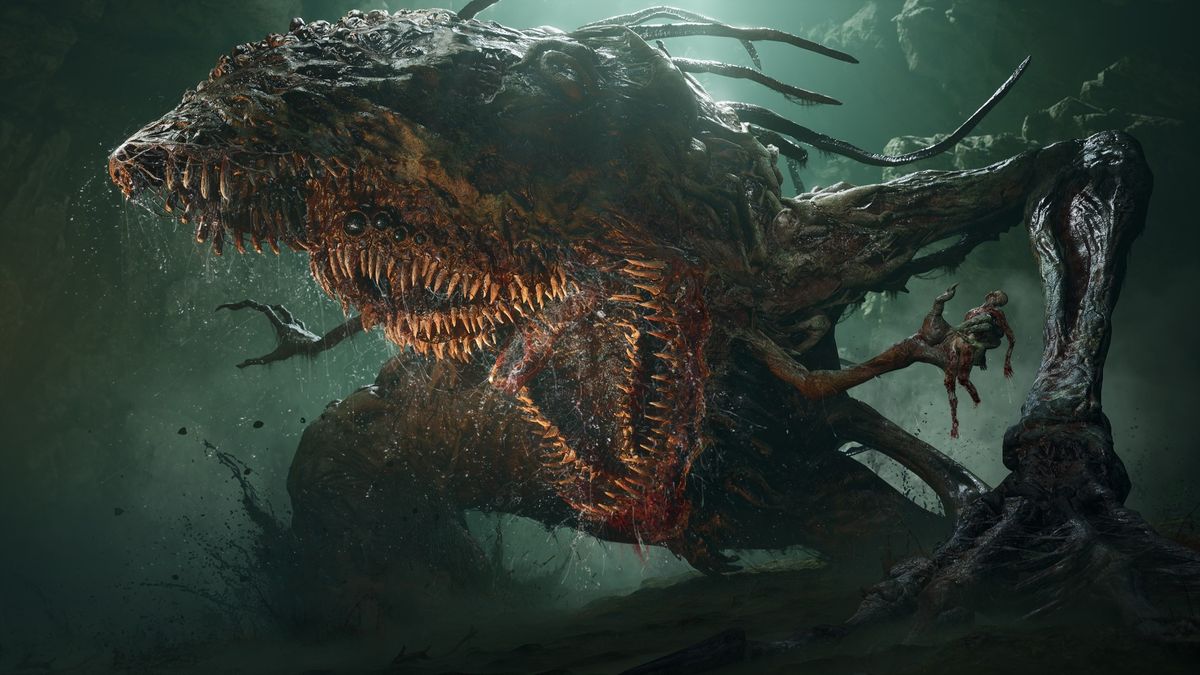
"We didn't set out to make a horror game," Lords of the Fallen creative director Cezar Virtosu tells me, after I'm done gushing over the harrowing sights and sounds of Umbral. "We're not making an alien or anything. We wanted the cosmic horror genre, which is reality warped by divinity. What you were to perceive to be divinity."
He's not wrong about warped realities. During my hands-on time with Lords of the Fallen, developer Hexworks' sequel-slash-reboot of the 2014 game revamped to suit a post-Elden Ring audience, I find myself constantly watching my back. A guttural groan ghosts past my left shoulder, just as another rattles from somewhere in the distance on my right. When I turn around, nothing is there. To check it out, I know I'll need to die – and I already can't wait to do so and rift from Axiom, in all its golden-hued autumnal glory, to the purple skies and thick grey fog of Umbral. Something is waiting for me just beyond the veil, and its presence, though obscured, is bleeding through bit by bit.
"Playing death"
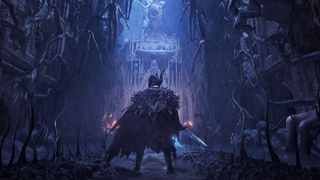
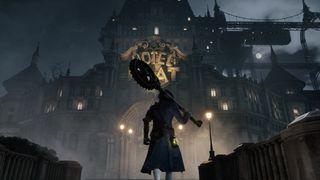
Spooky Soulslikes abound in 2023 - here's why Lies of P is a Soulslike for the horror fans, too.
The land of the dead kept calling me home in Lords of the Fallen, and not just because I happen to die an awful lot in Soulslikes. Starting my journey in the stunning environs of Axiom, all crisp earthy hues painted with streaks of sunlight, I'm given a mystical lamp with a unique purpose.
Holding out this lantern allows me to look into Umbral, the shadowy land of the dead, and see what lies beyond. I can sometimes hear strange sounds from the relative safety of Axiom – the undead definitely sense you, too – but even as the countless souls rake their claws against the thin fabric separating me from them, it's useless to resist the Umbral for long. That's because dying in Axiom resurrects me in the underworld, and dying down there means death for real.
Inspired by the cosmic horror creations of HP Lovecraft and Olivier de Sagazan, Virtosu and Hexworks' executive producer Saúl Gascon say the power of Umbral is to alter realities from the beyond. "Creatures exist in other planes, and through their influence, they warp and shift the [real] world. We give this as an example to people who want to understand: what is Umbral, is it like the upside down, is it like when Frodo puts on the ring?" Virtosu explains. "For us it was very important to anchor the concept well, before we could go out and explore aesthetics."
While the grim yet grand aesthetics of Umbral are jaw-droppingly impressive, especially as a huge horror fan, Umbral serves a unique function in Lords of the Fallen. It's not just a love letter to Cthulhu; with two simultaneous worlds, the game allows us to, quite literally, kill ourselves and play through our own demise.
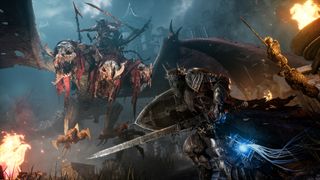
"We needed to find that one thing that makes us different," Gascon says of the decision to create what is essentially two games in one. "And so we went, okay, let's try to tap into the death loop, which is like the most important part of the genre. You know, you die, you need to go back for your spirits. But we said: what if we make it playable? What if we played death? And this is how it started."
Sign up to the 12DOVE Newsletter
Weekly digests, tales from the communities you love, and more
By tapping into two distinct worlds at once, Hexworks completely revamps how we view death in a Soulslike. Lords of the Fallen turns the most infamously iconic, eternally frustrating thing about a FromSoftware game into more than a second chance: it's a second world, one that functions entirely differently from the place we start out in. The result is a varied combat experience in a truly untamed universe, one that pulses with unknown wonders and its fair share of chills – no matter your familiarity with the genre.
Soulslikes are known for many things, but being approachable isn't one of them. Understandably, many fans of the genre might not think approachability a priority. The genre places such a stress on unforgiving death conditions, increasingly-punishing bosses, and a sharp and steep learning curve that's merciless to tackle yet satisfying to conquer. Lords of the Fallen seeks to change that, not by removing challenges, but smoothing the curve.
Joining the dark side
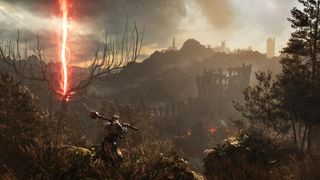
By tapping into two distinct worlds at once, Hexworks completely revamps how we view death in a Soulslike.
"[Bringing in new players] was of capital importance," Virtosu says of Hexworks' goals in creating the game. "We wanted to onboard people to mitigate frustration and help with understanding. Umbral gives you a second chance, and gives you new tools to mitigate difficulty. We think modernization works hand in hand with accessibility, and accessibility does not really mean less challenge, or easier. It means to give you the tools, some of them automatic, passive, some of them are at your fingertips, to mitigate that difficulty."
Umbral itself is one of said tools, essentially resurrecting you in the world of the dead while retaining the souls you've collected, unlike in Lords of the Fallen's "golden standard" influence Dark Souls 3. Umbral is a world unto its own, with a completely different color palette and level design from Axiom. Whether you're sent there following a defeat in battle or have rifted across using your Umbral lamp, the damage you take down in Umbral is known as withered damage. Withered damage will only apply if you manage to get hit before you land a blow to an enemy, so that in itself gives you a way to avoid a true death if you've run out of health flasks.
There are certain puzzles or ways forward that can only be accessed through the Umbral, and the high-risk-high-reward trade-off means there's always a reason to peer into the beyond and find out what lurks there. Oh, also, when you die and get sent to Umbral, you can find a rift point and re-enter Axiom from there. That means that yes, if you play cleverly enough, you never need to truly die in Lords of the Fallen – you can just swap between worlds, in something that operates similar to the likes of Legacy of Kain: Soul Reaver.
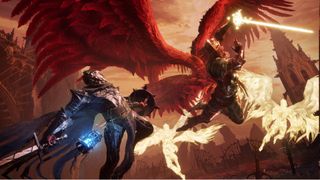
The ability to rift between Umbral and Axiom, while giving you a second chance at life, isn't an accessibility feature in itself. The two worlds work separately, mechanically speaking; there's soul-flaying and soul-siphoning to do at specific moments while in the underworld, and back up in Axiom, there's a litany of perilous bosses to contend with.
"Instead of just finding a world and boom, you start and you get killed over and over and over, we have a smooth curve with its [difficulty] peaks like Pieta," says Gascon. Being the first proper boss you run into, Pieta is no joke. Her massive AOE attacks make me feel as if I'm shouting at clouds to keep from being rained on, waving around my little sword all the while. I confessed my repeated defeat at the hands of Pieta to Gascon and Virtosu, both nodding sympathetically. "She's a big peak. It's the first boss. It's a skill check," they offered.
Lords of the Fallen and Hexworks look set to succeed at something many Soulslike creators have struggled to pull off for years: changing up the genre in a meaningful, interesting way that adds rather than detracts from a classic experience. There's enough newness to make Lords of the Fallen stand out as unique, but enough commonality between it and some of the best FromSoftware games that even the most brazen of Souls vets should feel right at home in its sprawling, dangerous world(s). Just don't stop and stare for too long down in Umbral; if you're unlucky, it stares right back.

Jasmine is a staff writer at 12DOVE. Raised in Hong Kong and having graduated with an English Literature degree from Queen Mary, University of London in 2017, her passion for entertainment writing has taken her from reviewing underground concerts to blogging about the intersection between horror movies and browser games. Having made the career jump from TV broadcast operations to video games journalism during the pandemic, she cut her teeth as a freelance writer with TheGamer, Gamezo, and Tech Radar Gaming before accepting a full-time role here at GamesRadar. Whether Jasmine is researching the latest in gaming litigation for a news piece, writing how-to guides for The Sims 4, or extolling the necessity of a Resident Evil: CODE Veronica remake, you'll probably find her listening to metalcore at the same time.











